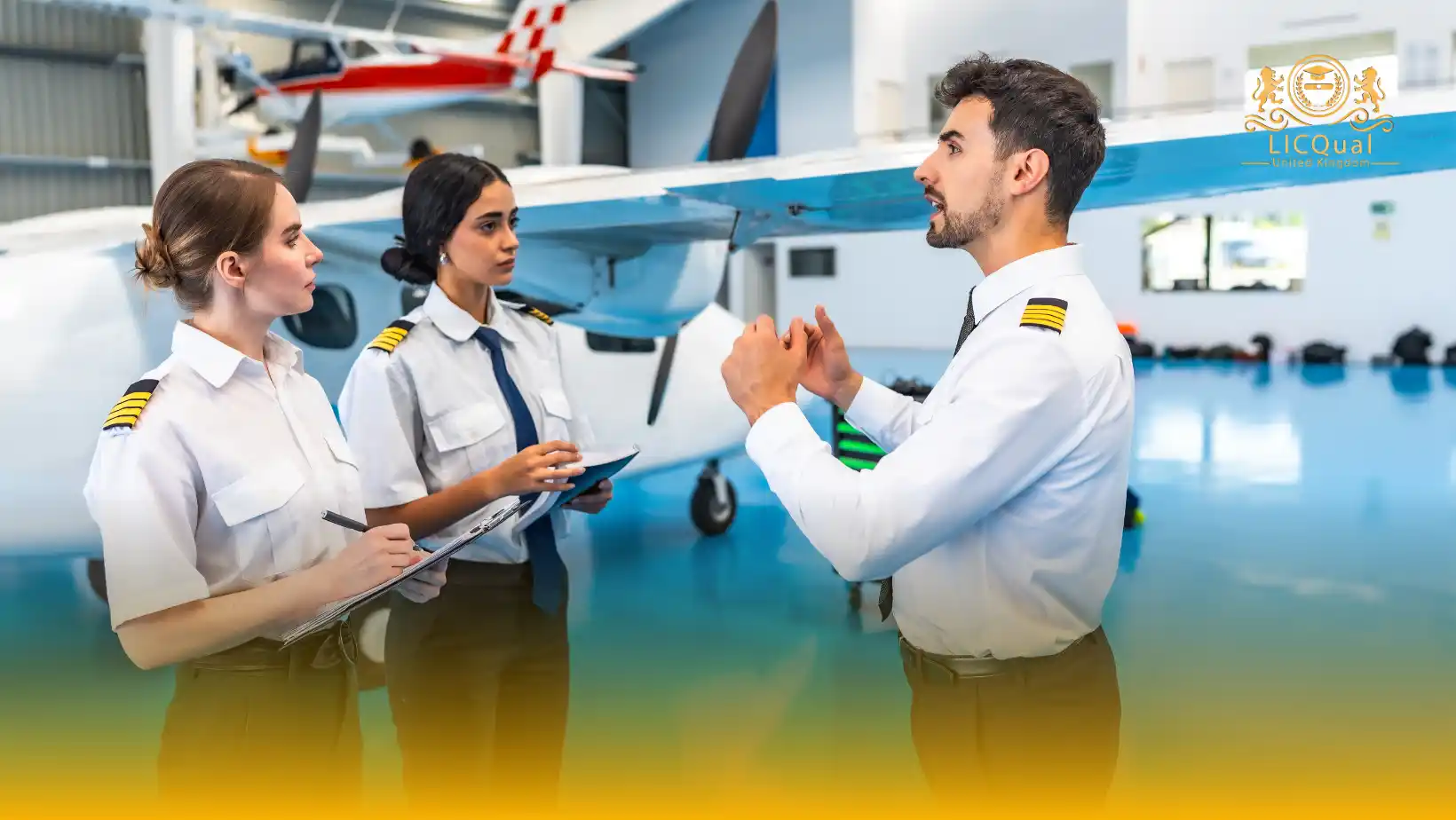The aviation industry is one of the most dynamic and fast‑growing sectors in the world, and with growth comes the need for skilled professionals who can balance operational efficiency with safety and compliance. The LICQual UK Level 3 Diploma in Aviation Operations and Risk Management is a UK‑accredited qualification designed to give learners a strong foundation in aviation operations, safety management, and risk assessment. This internationally recognized diploma is the perfect entry point for those who want to build a career in aviation or progress to higher‑level studies in aviation management.
This Level 3 Aviation Operations and Risk Management Diploma UK introduces learners to the essential principles of airline and airport operations, aviation safety, and compliance frameworks. You will gain practical knowledge of ground handling, passenger management, and operational procedures, while also developing the ability to identify, assess, and mitigate risks in aviation environments. The program blends academic knowledge with real‑world application, ensuring you graduate with skills that employers in airlines, airports, and aviation support services value highly.
One of the key strengths of this UK Accredited Diploma in Aviation Operations and Risk Management is its focus on both operational performance and safety culture. Learners will explore how aviation organizations maintain compliance with international standards such as ICAO and EASA, while also understanding the importance of customer service, communication, and teamwork in daily operations. By combining technical knowledge with professional skills, the course prepares you for a wide range of entry‑level roles in aviation.
The LICQual UK Level 3 Diploma in Aviation Operations and Risk Management is ideal for students, early‑career professionals, and international learners seeking a globally recognized qualification. With flexible study options and a curriculum aligned to international standards, this diploma provides a clear pathway to advanced qualifications and career progression in aviation safety, operations, and risk management.
If you are ready to take the first step toward a rewarding career in aviation, this diploma offers the knowledge, credibility, and practical skills to help you succeed in one of the world’s most exciting industries.
Course Overview
Qualification Title
LICQual UK Level 3 Diploma in Aviation Operations and Risk Management
Total Units
6
Total Credits
60
GLH
240
Qualification #
LICQ2201269
Qualification Specification
To enroll in the LICQual UK Level 3 Diploma in Aviation Operations and Risk Management, applicants must meet the following criteria:
|
Qualification# |
Unit Title |
Credits |
GLH |
|---|---|---|---|
|
LICQ2201269-1 |
Introduction to Aviation Operations |
10 |
40 |
|
LICQ2201269-2 |
Fundamentals of Aviation Safety and Risk Management |
10 |
40 |
|
LICQ2201269-3 |
Airline and Airport Ground Operations |
10 |
40 |
|
LICQ2201269-4 |
Aviation Security and Compliance Basics |
10 |
40 |
|
LICQ2201269-5 |
Customer Service and Communication in Aviation |
10 |
40 |
|
LICQ2201269-6 |
Introduction to Aviation Strategy and Planning |
10 |
40 |
By the end of this course, learners will be able to:
1. Introduction to Aviation Operations
By the end of this unit, learners will be able to:
- Explain the structure and functions of the global aviation industry.
- Identify the roles of airlines, airports, regulators, and service providers.
- Describe the economic and social impact of aviation worldwide.
- Recognize the importance of operational efficiency in aviation.
- Apply basic industry knowledge to real‑world aviation scenarios.
- Demonstrate awareness of future trends in aviation operations.
2. Fundamentals of Aviation Safety and Risk Management
By the end of this unit, learners will be able to:
- Explain the principles of aviation safety and risk management.
- Identify common hazards and risks in airline and airport operations.
- Apply basic risk assessment techniques to aviation scenarios.
- Demonstrate knowledge of international safety standards (ICAO, EASA).
- Recognize the importance of safety culture in aviation organizations.
- Recommend simple measures to improve safety performance.
3. Airline and Airport Ground Operations
By the end of this unit, learners will be able to:
- Describe the key functions of airline and airport ground operations.
- Demonstrate knowledge of passenger check‑in, boarding, and baggage handling.
- Explain the coordination between ground handling teams and flight crews.
- Apply operational procedures to ensure efficiency and safety.
- Recognize the importance of customer service in ground operations.
- Evaluate challenges in managing day‑to‑day airport operations.
4. Aviation Security and Compliance Basics
By the end of this unit, learners will be able to:
- Explain the importance of aviation security and compliance.
- Identify international security standards and regulatory frameworks.
- Demonstrate knowledge of airport and airline security procedures.
- Apply basic compliance checks to aviation operations.
- Recognize the role of security in maintaining passenger trust.
- Evaluate the impact of non‑compliance on aviation safety.
5. Customer Service and Communication in Aviation
By the end of this unit, learners will be able to:
- Demonstrate effective communication skills in aviation contexts.
- Explain the importance of customer service in airline and airport operations.
- Apply strategies to manage passenger expectations and resolve conflicts.
- Recognize cultural diversity and its impact on customer interactions.
- Evaluate the role of customer service in building aviation reputation.
- Develop professional communication skills for aviation careers.
6. Introduction to Aviation Strategy and Planning
By the end of this unit, learners will be able to:
- Explain the principles of strategic planning in aviation management.
- Demonstrate understanding of route planning and scheduling basics.
- Apply strategic tools to analyze competition and market opportunities.
- Recognize the role of government policy in aviation strategy.
- Evaluate the impact of global trends such as sustainability and digitalization.
- Develop basic strategic insights for future career progression in aviation.
The LICQual UK Level 3 Diploma in Aviation Operations and Risk Management is designed for learners who want to build a strong foundation in aviation safety, operations, and compliance. This UK‑accredited qualification is ideal for students, early‑career professionals, and international learners seeking a globally recognized diploma. Whether you are starting your journey in aviation, aiming to enhance your career prospects, or planning to progress to higher‑level studies, this course equips you with the essential skills and knowledge to succeed in the global aviation sector.
1. Students and Fresh Graduates
- Perfect for learners completing secondary education who want to enter aviation.
- Provides a UK‑accredited qualification to strengthen employability.
- Builds foundational knowledge of aviation operations and safety.
- Offers a pathway to higher studies in aviation management.
- Equips students with industry‑relevant skills for entry‑level roles.
2. Early‑Career Aviation Professionals
- Suitable for ground staff, cabin crew, or junior airline employees.
- Enhances understanding of aviation safety and risk management.
- Provides formal certification to support career progression.
- Strengthens knowledge of compliance and operational procedures.
- Opens opportunities in airlines, airports, and aviation support services.
3. Career Changers and Job Seekers
- Designed for individuals transitioning into aviation or transport roles.
- Provides structured training in aviation operations and risk management.
- Offers a recognized UK qualification to boost career credibility.
- Equips learners with practical skills for global aviation markets.
- Increases employability in airlines, airports, and logistics companies.
4. International Students and Global Learners
- Ideal for learners worldwide seeking a UK‑certified qualification.
- Offers flexible online study options for international accessibility.
- Provides globally relevant knowledge applicable across regions.
- Strengthens career opportunities in international aviation management.
- Recognized by employers and institutions across multiple countries.
5. Aviation Enthusiasts and Aspiring Professionals
- Suitable for individuals passionate about aviation and safety.
- Provides insights into airline operations and airport management.
- Builds knowledge of aviation risk management and compliance.
- Equips learners with skills to contribute to the aviation industry.
- Offers a stepping stone to advanced aviation management studies.
6. Logistics and Transport Industry Staff
- Tailored for employees in logistics, travel, and transport operations.
- Enhances knowledge of aviation operations and risk management.
- Provides training in customer service and communication.
- Equips staff with compliance knowledge for daily operations.
- Strengthens career prospects in aviation logistics and management.
7. Aspiring Aviation Managers and Leaders
- Designed for learners aiming to progress into supervisory roles.
- Provides essential knowledge of aviation strategy and planning.
- Equips learners with skills to manage airline and airport operations.
- Offers a recognized qualification to support career entry.
- Builds a foundation for progression into senior aviation management.
Assessment and Verification
All units within this qualification are subject to internal assessment by the approved centre and external verification by LICQual. The qualification follows a criterion-referenced assessment approach, ensuring that learners meet all specified learning outcomes.
To achieve a ‘Pass’ in any unit, learners must provide valid, sufficient, and authentic evidence demonstrating their attainment of all learning outcomes and compliance with the prescribed assessment criteria. The Assessor is responsible for evaluating the evidence and determining whether the learner has successfully met the required standards.
Assessors must maintain a clear and comprehensive audit trail, documenting the basis for their assessment decisions to ensure transparency, consistency, and compliance with quality assurance requirements.







